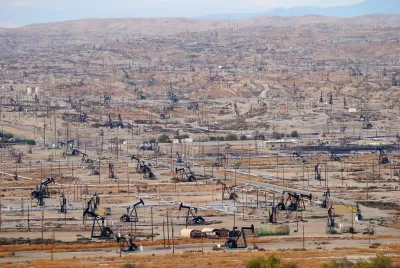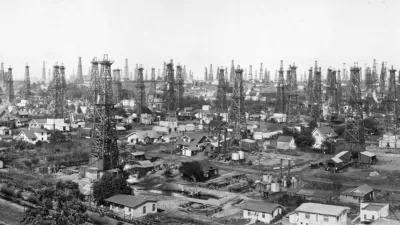The California Supreme Court on Aug. 3 unanimously overturned a successful 2016 Monterey County ballot measure that banned new oil and gas drilling. According to plaintiff Chevron USA, the justices recognized the ‘necessity of oil and gas drilling.’

Flash back seven years ago to Planetizen's coverage of the 2016 election and campaign, specifically to:
- One of the Most Important Energy Measure on the Ballot on Tuesday, November 6, 2016: While billed as an “anti-fracking initiative,” Measure Z in Monterey County, the 4th-largest oil-producing county in California, does far more. It bans new oil drilling and requires the cleaning of wastewater from current drilling operations.
The citizen-initiated Measure Z, sponsored by the grassroots group, Protect Monterey County, passed with over 56 percent of the vote on Nov. 8, 2016. The next month, Chevron U.S.A. and Aera Energy, both having active oil fields in the county, filed separate suits, claiming “that the county did not have jurisdiction over oil and gas operations and that the measure amounted to an unconstitutional taking of private property without just compensation,” according to Ballotpedia. They were joined by a local school district that relies on the Chevron oil field for nearly 90% of it property tax funding.
“Supporters [of the measure] said it would combat pollution and climate change,” wrote Bob Egelko, courts reporter for the San Francisco Chronicle on August 3 in the source article for this post.
But lower courts said the measure conflicted with longstanding California laws and the state’s high court agreed Thursday. Justice Martin Jenkins said a law passed in 1939 and amended most recently in 1972 requires state officials to supervise production “in a way that serves the dual purpose of ensuring the state has adequate oil and gas resources, while protecting the environment.”
An attorney for Chevron U.S.A. ... said the court rightly found that California law “recognizes the necessity” of oil and gas production. “Chevron is pleased that this decision brings an end to seven years of litigation and appeals,” Jeffrey Dintzer said in a statement.
Preemption
To be sure, it wasn't just the need to supply Californians with oil and gas that swayed the courts. “The trial court entered judgment in favor of plaintiffs on state and federal preemption grounds,” wrote Jenkins in the 24-page ruling, "Chevron U.S.A. Inc. v. County Of Monterey [pdf]. "[Protect Monterey County] appealed, and the Court of Appeal affirmed.”
Next battles
“Thursday’s ruling, however, steered clear of the location issue,” added Egelko, and then described the passage of SB 1137: Health Protection Zones for Frontline Communities [pdf] last year by Sens. Lena Gonzalez and Monique Limón. The law has yet to take effect due to a challenge by the state's oil and gas industry:
- Election 2024: California Oil Drilling Referendum, July 30, 2023: Environmentalists gear up for battle to reject a referendum funded by Big Oil on a law passed last year that would ban oil and gas drilling within 3,200 feet of homes, schools, nursing homes, and hospitals.
Finally, the state supreme court's ruling last week may suggest how they will rule on a somewhat similar oil and gas drilling ban in the city of Los Angeles, though the result of legislation not a citizens' initiative.
- Lawsuit Challenges L.A. Oil Drilling Ban, January 12, 2023: Oil companies with operations in the city of Los Angeles are suing over an ordinance that seeks to phase out drilling within city limits due to public health and environmental concerns.
- Los Angeles To Phase Out Oil Drilling, December 6, 2022: The city has banned new wells and will end all extraction within two decades.
- In Historic Move, L.A. County to Phase Out Oil Wells, September 17, 2021: The long history of oil extraction in the nation's most populous county is entering its final chapter.
Hat tip to Kathy Dervin, Sierra Club California Energy - Climate Committee.
FULL STORY: California Supreme Court rejects Monterey County ban on new oil, gas drilling

Maui's Vacation Rental Debate Turns Ugly
Verbal attacks, misinformation campaigns and fistfights plague a high-stakes debate to convert thousands of vacation rentals into long-term housing.

Planetizen Federal Action Tracker
A weekly monitor of how Trump’s orders and actions are impacting planners and planning in America.

Chicago’s Ghost Rails
Just beneath the surface of the modern city lie the remnants of its expansive early 20th-century streetcar system.

Bend, Oregon Zoning Reforms Prioritize Small-Scale Housing
The city altered its zoning code to allow multi-family housing and eliminated parking mandates citywide.

Amtrak Cutting Jobs, Funding to High-Speed Rail
The agency plans to cut 10 percent of its workforce and has confirmed it will not fund new high-speed rail projects.

LA Denies Basic Services to Unhoused Residents
The city has repeatedly failed to respond to requests for trash pickup at encampment sites, and eliminated a program that provided mobile showers and toilets.
Urban Design for Planners 1: Software Tools
This six-course series explores essential urban design concepts using open source software and equips planners with the tools they need to participate fully in the urban design process.
Planning for Universal Design
Learn the tools for implementing Universal Design in planning regulations.
planning NEXT
Appalachian Highlands Housing Partners
Mpact (founded as Rail~Volution)
City of Camden Redevelopment Agency
City of Astoria
City of Portland
City of Laramie




























